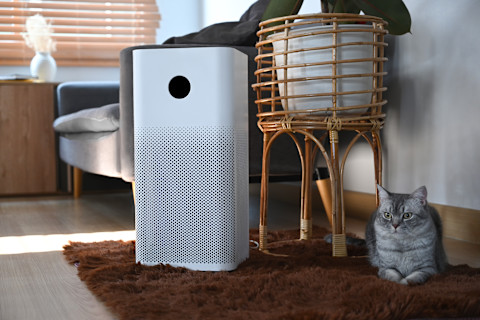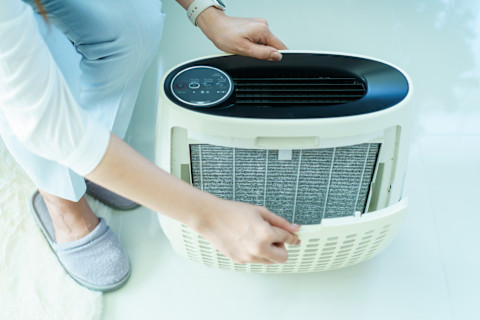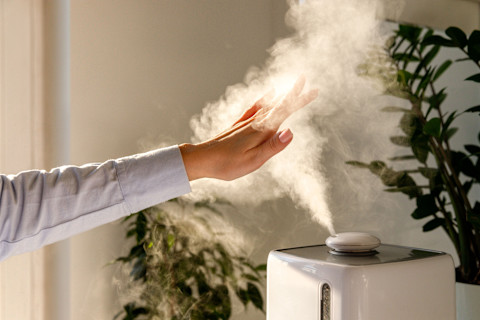Is an Air Purifier or Humidifier Better?
Updated on

Air Purifier vs Humidifier
Whether you're curious about how to remove air pollution from your home, or want to weigh the best air purifier and humidifier options, we've got the knowledge you need. This guide will help you to make the best decision today.
In this article, we will cover the following topics:
- Air Purifier vs Humidifier Differences
- When Should I Use an Air Purifier or Humidifier?
- How Do Air Purifiers Work?
- How Do Humidifiers Work?
- Best Air Purifier & Humidifier Combined Products
- Find Local Air Purification Advice on HomeStars
- FAQs Common Questions
Air Purifier vs Humidifier Differences
Air purifiers clean the air by removing pollutants, allergens, and particles, whereas humidifiers add moisture to the air to prevent dryness, especially in dry climates or during winter.
Here’s the key differences between air purifiers vs humidifiers:
| Feature | Air Purifier vs Humidifier |
|---|---|
| Primary Function | Removes harmful particles vs adds moisture to air |
| Benefits | Reduces allergens and pollutants vs solves dry air issues |
When Should I Use an Air Purifier or Humidifier?
Choosing between an air purifier and a humidifier depends on your home’s needs and indoor environment.
An air purifier works to remove pollutants, dust, allergens, and airborne particles. This makes it the better choice if your main concern is keeping the air clean.
A humidifier, on the other hand, adds moisture to the air. This is especially useful in dry conditions or during the winter months when heating systems tend to reduce indoor humidity.
In some cases, an air purifier and humidifier combo can be a smart solution. It gives you cleaner air while also helping to maintain balanced indoor moisture levels.
Which is better for health?
You might be wondering: Is an air purifier or humidifier best for health issues?
Air purifiers are ideal for reducing allergens like dust and pollen, which makes them helpful for people with allergies or sensitivities.
Humidifiers are better for easing dry skin, irritated throats, and discomfort caused by low indoor humidity.
If there is too much humidity in your home, it may be best if you talk to a professional about water damage, especially if there is mold present. You can also see this water damage restoration cost guide for more information.
How Do Air Purifiers Work?

Air purifiers are devices made to clean indoor air by pulling it in, running it through filters, and then releasing it back out.
Most models use HEPA filters to trap tiny particles like dust, pollen, and pet dander, while activated carbon filters help absorb odours and gases.
How air purifiers help:
Capture dust, pollen, and pet dander that can trigger allergies
Reduce VOCs (volatile organic compounds) released from paints and household products
Help control odours from cooking, pets, or smoke
Improve the overall freshness and cleanliness of indoor air
How Do Humidifiers Work?

A humidifier is a device that adds moisture to the air, helping to balance indoor humidity levels. It works by releasing water vapour or mist into the room, which can be especially helpful in dry climates or during winter when heating makes the air feel drier.
How humidifiers help:
Add moisture to prevent air from becoming too dry
Ease dry skin, throat irritation, and nasal congestion
Help reduce dry coughs caused by low humidity
MyBuilder-Tip: Use a humidifier during colder months to combat the drying effects of heating systems and make your home feel more comfortable. If you want to look at another more serious upgrade for this, you can read this heating recovery ventilation system cost guide.
Best Air Purifier & Humidifier Combined Products
Selecting the right air purifier and humidifier combo can enhance both air quality and humidity control in your living space.
These units combine the functions of air purification and moisture addition, making them a convenient choice for those seeking dual benefits.
Popular types include smart models that can be controlled via mobile apps, energy-efficient options that save on utility bills, and compact designs suitable for small rooms.
Here’s a quick summary of the options out there:
- Smart models: Offer remote control via apps for ease of use.
- Energy-efficient options: Help reduce electricity costs while maintaining air quality.
- Compact designs: Ideal for smaller spaces without compromising on performance.
Find Local Air Purification Advice on HomeStars
Struggling with dust, odours, or poor indoor air quality? It’s so quick to post your problem today and connect with trusted local professionals who can offer the right air purification advice and solutions for your space.
Whether you’re dealing with allergies, pet dander, or just want fresher, cleaner air, getting expert guidance is the first step toward a healthier home environment.
FAQ: Common Questions Readers Ask About Air Purifiers and Humidifiers
What should I look for when choosing the best air purifier and humidifier for my needs?
For an air purifier, consider the filter type (HEPA for allergens), room size, CADR (Clean Air Delivery Rate), and noise levels. For a humidifier, look for features like adjustable mist control, easy cleaning, and capacity suited to your room size. Consider models with a humidistat to monitor humidity levels. Also, factor in maintenance costs and the need for replacement parts.
What’s the difference between an air purifier, humidifier, diffuser, and dehumidifier?
An air purifier removes airborne particles like dust, pollen, and allergens. A humidifier adds moisture to dry air, while a dehumidifier does the opposite by removing excess moisture to prevent dampness and mold. A diffuser is mainly for dispersing essential oils into the air for fragrance or relaxation, but it doesn’t clean or significantly change humidity.
Which device is best for mold problems between an air purifier, humidifier, dehumidifier, or diffuser?
The best choice is a dehumidifier, as it reduces excess moisture that allows mold to grow. An air purifier can also help by filtering out mold spores from the air. A humidifier is not recommended in damp spaces, since adding moisture can worsen mold issues. A diffuser only adds scents and doesn’t help with mold prevention.
Related questions on Ask a pro
See what others are asking our expert pros. Browse all questions
Air conditioning
Humidifier + Thermostat
Norman Dewar 02/01/2026 - 4:39 PM
I want to replace my bypass humidifier and thermostat with something that performs better, and has an outdoor connect for automatic control. My house it 2000 square feet. Do you have any recommendations for the products to use?
2 answers
Air conditioning
AC Unit Out
Anonymous user 24/11/2025 - 8:49 AM
My AC unit has gone out in the middle of winter, should I fix now or later?
7 answers
Air conditioning
How to clean your AC machine
Emmanuel Red 04/11/2025 - 9:11 AM
How to clean your AC machine
1 answer
Need expert advice?
Ask a questionDiscuss your job with pros so they can accurately estimate the cost.